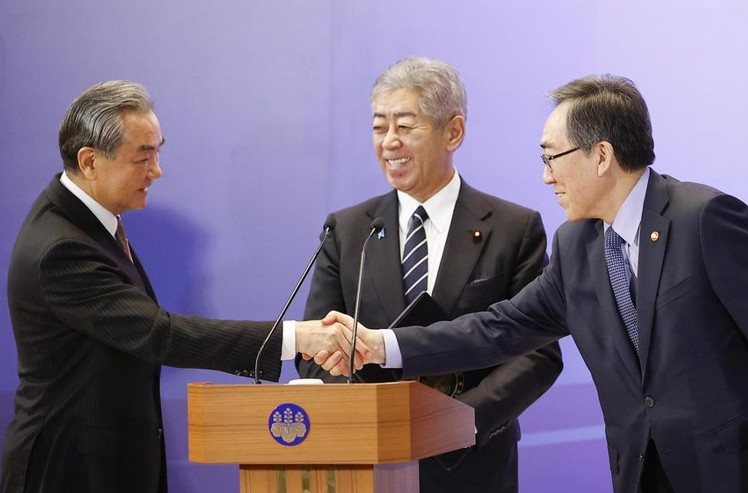TOKYO – The foreign ministers of China, Japan, and South Korea convened in Tokyo today, March 22, in a bid to revitalize trilateral cooperation and lay the groundwork for a potential leaders’ summit by the end of the year. The meeting, which lasted 80 minutes, marked the 11th ministerial gathering between the three nations and was the first visit by a Chinese foreign minister to Japan since November 2020.
A Long-Awaited Leaders’ Summit?
Japan had expressed hopes of hosting the summit within the first half of 2025, yet the timeframe remains uncertain. In a joint statement, the three ministers agreed to hold the summit “at the earliest convenient time,” highlighting the challenges of sustaining this trilateral framework, which was originally established in 2007 with the aim of annual meetings. However, in the 19 years since its inception, the leaders of the three countries have met only nine times, most recently in Seoul in May 2024.
The irregularity of these summits reflects the complexities of diplomatic relations in Northeast Asia, with historical grievances, regional security issues, and global economic uncertainties often complicating efforts for closer cooperation.
Economic Cooperation Takes Center Stage
Chinese Foreign Minister Wang Yi emphasized economic collaboration as a key priority, proposing renewed discussions on a trilateral free trade agreement (FTA). “We will work towards restarting talks on a trilateral free trade agreement,” Wang stated during a joint press conference. “We will adhere to multilateralism and free trade and promote economic globalization in a fairer and more inclusive direction.”
Wang also underscored the importance of stable supply chains and deeper scientific and technological collaboration among the three nations. “We should work together to build an Asian frontier of scientific and technological innovation,” he said, pointing to the rapid advancements in artificial intelligence, semiconductor manufacturing, and renewable energy sectors that could benefit from regional cooperation.
Diplomatic Significance and Regional Stability
The Tokyo meeting signals a cautious warming of relations, particularly between Japan and China, following years of tensions over territorial disputes and economic policies. The participation of South Korean Foreign Minister Cho Tae-yul further reflects Seoul’s strategic interest in balancing its close security ties with the United States while maintaining strong economic ties with Beijing and Tokyo.
While economic issues dominated the discussions, regional security matters—such as North Korea’s missile program and rising geopolitical tensions in the Indo-Pacific—were also on the agenda. However, specific details on security-related agreements remained sparse, indicating that economic diplomacy is taking precedence in the current trilateral engagement.
Outlook: A New Era of Regional Cooperation?
As the three nations push toward a potential summit by the end of 2025, analysts are cautiously optimistic about the revival of trilateral diplomacy. However, lingering political and historical tensions, as well as external geopolitical influences, could pose challenges.
For now, the Tokyo meeting represents a step forward in strengthening economic ties and enhancing regional stability. Whether this momentum leads to a sustained trilateral framework remains to be seen. (zai)
Photo: Japanese Ministry of Foreign Affairs

